Deck 5: Trigonometric Functions
Question
Question
Question
Question
Question
Question
Question
Question
Question
Question
Question
Question
Question
Question
Question
Question
Question
Question
Question
Question
Question
Question
Question
Question
Question
Question
Question
Question
Question
Question
Question
Question
Question
Question
Question
Question
Question
Question
Question
Question
Question
Question
Question
Question
Question
Question
Question
Question
Question
Question
Question
Question
Question
Question
Question
Question
Question
Question

Unlock Deck
Sign up to unlock the cards in this deck!
Unlock Deck
Unlock Deck
1/58
Play
Full screen (f)
Deck 5: Trigonometric Functions
1
Find the value of the trigonometric function to four decimal places. cos 35 °
A)-0.4282
B)0.5736
C)0.8192
D)-0.9037
E)1.2208
A)-0.4282
B)0.5736
C)0.8192
D)-0.9037
E)1.2208
0.8192
2
Find the number of radians in 4  revolutions. Leave answer in terms of p .
revolutions. Leave answer in terms of p .
A)
B)
C)
D)
E)
 revolutions. Leave answer in terms of p .
revolutions. Leave answer in terms of p .A)

B)

C)

D)

E)


3
Angle of Rotation and Distance. The minute hand on the clock atop city hall measures 6 feet 3 inches from its tip to its axle. Through what angle (in radians)does the minute hand pass between 9:17 A.M. and 9:40 A.M.?
A)
B)
C)
D)
E)
A)

B)

C)

D)

E)


4
Find the measure of the complement and the supplement of the angle, if possible. 5 ° 8 ¢
A)84 ° 92 ¢, 174 ° 92 ¢
B)Does not exist
C)85 ° 52 ¢, 175 ° 52 ¢
D)84 ° 82 ¢, 174 ° 82 ¢
E)84 ° 52 ¢, 174 ° 52 ¢
A)84 ° 92 ¢, 174 ° 92 ¢
B)Does not exist
C)85 ° 52 ¢, 175 ° 52 ¢
D)84 ° 82 ¢, 174 ° 82 ¢
E)84 ° 52 ¢, 174 ° 52 ¢

Unlock Deck
Unlock for access to all 58 flashcards in this deck.
Unlock Deck
k this deck
5
Find the exact value of the expression. sin  cos
cos 

A)
B)
C)
D)
E)
 cos
cos 

A)

B)

C)

D)

E)


Unlock Deck
Unlock for access to all 58 flashcards in this deck.
Unlock Deck
k this deck
6
Convert the degree measure of the angle to radians. Round answer to the nearest hundredth. 223 °
A)7.78
B)7.01
C)2.59
D)1.28
E)3.89
A)7.78
B)7.01
C)2.59
D)1.28
E)3.89

Unlock Deck
Unlock for access to all 58 flashcards in this deck.
Unlock Deck
k this deck
7
Find the area of the following triangle given a = 13 in, b = 20 in, and q = 44 . Round answer to the nearest integer. 
A)181 in2
B)90 in2
C)59 in2
D)94 in2
E)139 in2

A)181 in2
B)90 in2
C)59 in2
D)94 in2
E)139 in2

Unlock Deck
Unlock for access to all 58 flashcards in this deck.
Unlock Deck
k this deck
8
Distance Across a Marsh. In the diagram below, D ABC is a right triangle and AB represents the distance across a marsh. If C measures 37 and BC measures 44 m, find AB. Round answer to the nearest meter. 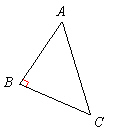
A)34 m
B)35 m
C)26 m
D)33 m
E)36 m

A)34 m
B)35 m
C)26 m
D)33 m
E)36 m

Unlock Deck
Unlock for access to all 58 flashcards in this deck.
Unlock Deck
k this deck
9
Find the measure of the reference angle q ¢ given q = 1398°.
A)228 °
B)318 °
C)138 °
D)42 °
E)48 °
A)228 °
B)318 °
C)138 °
D)42 °
E)48 °

Unlock Deck
Unlock for access to all 58 flashcards in this deck.
Unlock Deck
k this deck
10
Convert the DMS measure to its equivalent decimal degree measure. Round answer to three decimal places. 213 ° 29 ¢ 48 ²
A)213.483
B)212.503
C)213.497
D)213.883
E)214.283
A)213.483
B)212.503
C)213.497
D)213.883
E)214.283

Unlock Deck
Unlock for access to all 58 flashcards in this deck.
Unlock Deck
k this deck
11
Angular Rotation of Two Pulleys. A pulley with a radius of 17 inches uses a belt to drive a pulley with a radius of 24 inches. The 17-inch pulley turns through an angle of 150 ° . Find the radian measure of the angle through which the 24-inch pulley turns.
A)
B)
C)
D)
E)
A)

B)

C)

D)

E)


Unlock Deck
Unlock for access to all 58 flashcards in this deck.
Unlock Deck
k this deck
12
Area of an Isosceles Triangle. Consider an isosceles triangle with legs measuring 21 cm each and base angles measuring 26° each. Find the area of the triangle. Round to the nearest integer.
A)85 cm2
B)105 cm2
C)356 cm2
D)87 cm2
E)174 cm2
A)85 cm2
B)105 cm2
C)356 cm2
D)87 cm2
E)174 cm2

Unlock Deck
Unlock for access to all 58 flashcards in this deck.
Unlock Deck
k this deck
13
Convert the radian measure to exact degree measure. 
A)80 °
B)502.4 °
C)160 °
D)202.5 °
E)320 °

A)80 °
B)502.4 °
C)160 °
D)202.5 °
E)320 °

Unlock Deck
Unlock for access to all 58 flashcards in this deck.
Unlock Deck
k this deck
14
Linear Speed of a Truck. Each tire on a truck has a radius of 16 inches. The tires are rotating at 440 revolutions per minute. Find the speed of the truck to the nearest mile per hour.
A)13 mph
B)31 mph
C)21 mph
D)80 mph
E)42 mph
A)13 mph
B)31 mph
C)21 mph
D)80 mph
E)42 mph

Unlock Deck
Unlock for access to all 58 flashcards in this deck.
Unlock Deck
k this deck
15
Height of a Building. A surveyor determines that the angle of elevation from a transit to the top of a building is 26.4 . The transit is positioned 4.8 feet above ground level and 126 feet from the building. Find the height of the building to the nearest tenth of a foot. 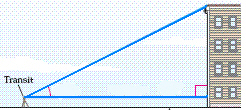
A)67.3 ft
B)117.7 ft
C)62.5 ft
D)57.7 ft
E)60.8 ft

A)67.3 ft
B)117.7 ft
C)62.5 ft
D)57.7 ft
E)60.8 ft

Unlock Deck
Unlock for access to all 58 flashcards in this deck.
Unlock Deck
k this deck
16
Angular Rotation of Two Pulleys. A pulley with a diameter of 1.4 meters uses a belt to drive a pulley with a diameter of 0.4 meter. The 1.4-meter pulley turns through an angle of 240 ° . Find the degree measure of the angle through which the 0.4-meter pulley turns.
A)
B)
C)
D)
E)
A)

B)

C)

D)

E)


Unlock Deck
Unlock for access to all 58 flashcards in this deck.
Unlock Deck
k this deck
17
Find the value of the trigonometric function to four decimal places. tan 41.1°
A)1.1463
B)3.7698
C)0.8724
D)0.2653
E)1.3270
A)1.1463
B)3.7698
C)0.8724
D)0.2653
E)1.3270

Unlock Deck
Unlock for access to all 58 flashcards in this deck.
Unlock Deck
k this deck
18
Use the Reference Angle Theorem to find the exact value of the trigonometric function. 
A)
B)
C)
D)
E)

A)

B)

C)

D)

E)


Unlock Deck
Unlock for access to all 58 flashcards in this deck.
Unlock Deck
k this deck
19
Distance of a Descent. An airplane traveling at 242 mph is descending at an angle of depression of 8°. How many miles will the plane descend in 8 minutes? Round answer to the nearest tenth of a mile.
A)33.7 mi
B)31.9 mi
C)32.0 mi
D)4.5 mi
E)5.6 mi
A)33.7 mi
B)31.9 mi
C)32.0 mi
D)4.5 mi
E)5.6 mi

Unlock Deck
Unlock for access to all 58 flashcards in this deck.
Unlock Deck
k this deck
20
Width of a Ramp. A skateboarder wishes to build a jump ramp that is inclined at a 11° angle and that has a maximum height of 29.2 inches. Find the horizontal width of the ramp. Round answer to the nearest tenth of an inch.
A)153.0 in
B)19.7 in
C)29.7 in
D)150.2 in
E)56.6 in
A)153.0 in
B)19.7 in
C)29.7 in
D)150.2 in
E)56.6 in

Unlock Deck
Unlock for access to all 58 flashcards in this deck.
Unlock Deck
k this deck
21
Find the exact value of the function. sec 
A)
B)
C)
D)
E)

A)

B)

C)

D)

E)


Unlock Deck
Unlock for access to all 58 flashcards in this deck.
Unlock Deck
k this deck
22
Find an approximate value of the function. Round your answer to the nearest ten-thousandth. cot 2.58
A)1.8778
B)0.6292
C)-0.6292
D)-1.1815
E)-1.5894
A)1.8778
B)0.6292
C)-0.6292
D)-1.1815
E)-1.5894

Unlock Deck
Unlock for access to all 58 flashcards in this deck.
Unlock Deck
k this deck
23
Find two values of q , 0 q 360 that satisfy the given trigonometric equation. 
A)315 ° , 225 °
B)45 ° , 315 °
C)315 ° , 135 °
D)45 ° , 135 °
E)135 ° , 225 °

A)315 ° , 225 °
B)45 ° , 315 °
C)315 ° , 135 °
D)45 ° , 135 °
E)135 ° , 225 °

Unlock Deck
Unlock for access to all 58 flashcards in this deck.
Unlock Deck
k this deck
24
State the period of the function.  csc t
csc t
A)2 p
B)
C)p
D)
E)3 p
 csc t
csc tA)2 p
B)

C)p
D)

E)3 p

Unlock Deck
Unlock for access to all 58 flashcards in this deck.
Unlock Deck
k this deck
25
Perform the indicated operation and simplify. 
A)1
B)
C)
D)
E)

A)1
B)

C)

D)

E)


Unlock Deck
Unlock for access to all 58 flashcards in this deck.
Unlock Deck
k this deck
26
Use the unit circle below to find all real numbers t between 0 and 2 p for which sin t = 0.3. Estimate answer to the nearest tenth. 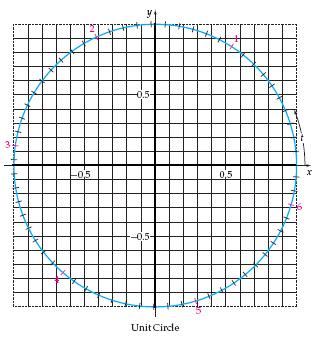
A)1.9, 4.4
B)1.3, 5.0
C)3.4, 6.0
D)6.0, 1.9
E)0.3, 2.8

A)1.9, 4.4
B)1.3, 5.0
C)3.4, 6.0
D)6.0, 1.9
E)0.3, 2.8

Unlock Deck
Unlock for access to all 58 flashcards in this deck.
Unlock Deck
k this deck
27
Use the unit circle below to find all real numbers t between 0 and 2 p for which cos t = 0.9. Estimate answer to the nearest tenth. 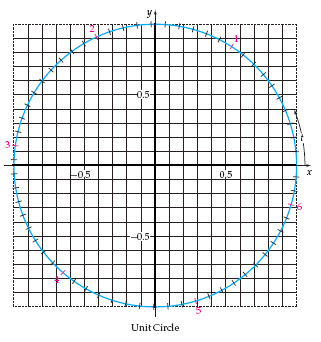
A)0.5, 5.8
B)4.3, 5.2
C)2.0, 0.5
D)2.7, 3.6
E)1.1, 2.0

A)0.5, 5.8
B)4.3, 5.2
C)2.0, 0.5
D)2.7, 3.6
E)1.1, 2.0

Unlock Deck
Unlock for access to all 58 flashcards in this deck.
Unlock Deck
k this deck
28
Use the unit circle below to estimate cos 3.3 to the nearest tenth. 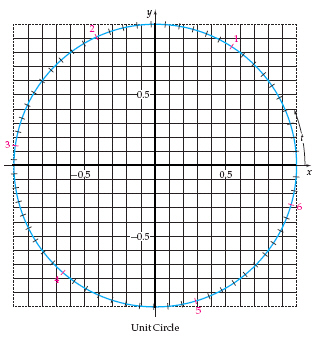
A)3.3
B)0.2
C)-0.2
D)-1.0
E)1.0

A)3.3
B)0.2
C)-0.2
D)-1.0
E)1.0

Unlock Deck
Unlock for access to all 58 flashcards in this deck.
Unlock Deck
k this deck
29
Approximate the given trigonometric function to six significant digits. tan 124 °
A)-10.7321
B)10.7321
C)1.48256
D)-0.674509
E)-1.48256
A)-10.7321
B)10.7321
C)1.48256
D)-0.674509
E)-1.48256

Unlock Deck
Unlock for access to all 58 flashcards in this deck.
Unlock Deck
k this deck
30
Find the exact value of the expression. sin 330 ° - cos 300 ° tan 315°
A)-0.5
B)-1
C)0
D)0.5
E)0.25
A)-0.5
B)-1
C)0
D)0.5
E)0.25

Unlock Deck
Unlock for access to all 58 flashcards in this deck.
Unlock Deck
k this deck
31
Use the unit circle below to estimate sin 4.9 to the nearest tenth. 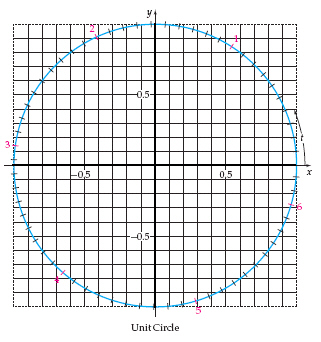
A)1.0
B)0.2
C)4.9
D)-0.2
E)-1.0

A)1.0
B)0.2
C)4.9
D)-0.2
E)-1.0

Unlock Deck
Unlock for access to all 58 flashcards in this deck.
Unlock Deck
k this deck
32
Determine whether the function is even, odd, or neither. v(x)= 
A)Even
B)Odd
C)Neither

A)Even
B)Odd
C)Neither

Unlock Deck
Unlock for access to all 58 flashcards in this deck.
Unlock Deck
k this deck
33
Find two values of q 0, 2 p that satisfy the given trigonometric equation. 
A)
B)
C)
D)
E)

A)

B)

C)

D)

E)


Unlock Deck
Unlock for access to all 58 flashcards in this deck.
Unlock Deck
k this deck
34
Find the exact value of the function. 
A)undefined
B)0.5
C)0
D)-1
E)1

A)undefined
B)0.5
C)0
D)-1
E)1

Unlock Deck
Unlock for access to all 58 flashcards in this deck.
Unlock Deck
k this deck
35
Complete the identity.  = ?
= ?
A)
B)
C)cot t
D)
E)
 = ?
= ?A)

B)

C)cot t
D)

E)


Unlock Deck
Unlock for access to all 58 flashcards in this deck.
Unlock Deck
k this deck
36
Write the expression in terms of a single trigonometric function or a constant. 
A)
B)
C)
D)
E)

A)

B)

C)

D)

E)


Unlock Deck
Unlock for access to all 58 flashcards in this deck.
Unlock Deck
k this deck
37
Determine whether the function is even, odd, or neither. H ( x )=  , x 0
, x 0
A)Even
B)Odd
C)Neither
 , x 0
, x 0A)Even
B)Odd
C)Neither

Unlock Deck
Unlock for access to all 58 flashcards in this deck.
Unlock Deck
k this deck
38
Evaluate W ( t )for the given t . t = 
A)
B)
C)
D)
E)

A)

B)

C)

D)

E)


Unlock Deck
Unlock for access to all 58 flashcards in this deck.
Unlock Deck
k this deck
39
Write the expression in terms of a single trigonometric function or a constant. 
A)
B)
C)
D)1
E)

A)

B)

C)

D)1
E)


Unlock Deck
Unlock for access to all 58 flashcards in this deck.
Unlock Deck
k this deck
40
Perform the indicated operation and simplify. 
A)
B)1
C)
D)
E)

A)

B)1
C)

D)

E)


Unlock Deck
Unlock for access to all 58 flashcards in this deck.
Unlock Deck
k this deck
41
State the period of the function. 
A)
B)p
C)5 p
D)
E)3 p

A)

B)p
C)5 p
D)

E)3 p

Unlock Deck
Unlock for access to all 58 flashcards in this deck.
Unlock Deck
k this deck
42
Graph the function by using translations. 
A)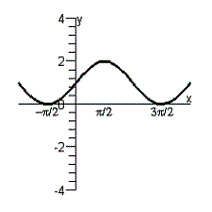
B)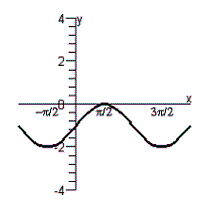
C)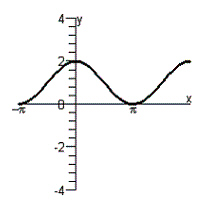
D)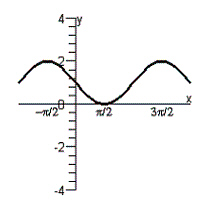
E)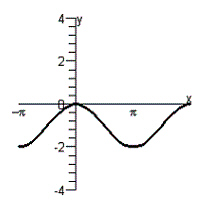

A)

B)

C)

D)

E)


Unlock Deck
Unlock for access to all 58 flashcards in this deck.
Unlock Deck
k this deck
43
State the period of the function. 
A)2 p
B)
C)
D)9 p
E)

A)2 p
B)

C)

D)9 p
E)


Unlock Deck
Unlock for access to all 58 flashcards in this deck.
Unlock Deck
k this deck
44
Write an equation for the simple harmonic motion that satisfies the given conditions. Assume that the maximum displacement occurs at t = 0. Frequency = 1.2 cycles per second, amplitude = 5 centimeters
A)
B)
C)
D)
E)
A)

B)

C)

D)

E)


Unlock Deck
Unlock for access to all 58 flashcards in this deck.
Unlock Deck
k this deck
45
Graph the function. 
A)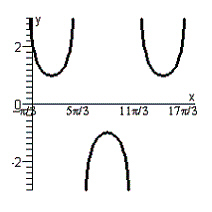
B)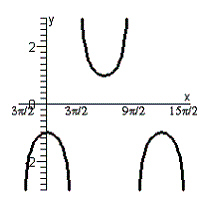
C)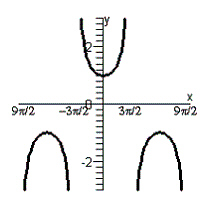
D)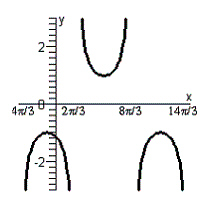
E)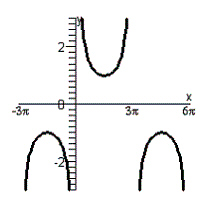

A)

B)

C)

D)

E)


Unlock Deck
Unlock for access to all 58 flashcards in this deck.
Unlock Deck
k this deck
46
Find the amplitude, phase shift, and period for the graph of the function. 
A)amplitude = 1, phase shift = 3 p , period =
B)amplitude = 3, phase shift = , period =
, period = 
C)amplitude = 3, phase shift = , period = 2 p
, period = 2 p
D)amplitude = 3, phase shift = 3 p , period = p
E)amplitude = 3, phase shift = , period = 2 p
, period = 2 p

A)amplitude = 1, phase shift = 3 p , period =

B)amplitude = 3, phase shift =
 , period =
, period = 
C)amplitude = 3, phase shift =
 , period = 2 p
, period = 2 pD)amplitude = 3, phase shift = 3 p , period = p
E)amplitude = 3, phase shift =
 , period = 2 p
, period = 2 p
Unlock Deck
Unlock for access to all 58 flashcards in this deck.
Unlock Deck
k this deck
47
State the amplitude and period of the function defined by the equation. 
A)amplitude = 1.5 p , period = -2
B)amplitude = 2, period = 0.375 p
C)amplitude = 2, period = 1.5 p
D)amplitude = -2, period = 0.75 p
E)amplitude = 2 p , period = 1.5

A)amplitude = 1.5 p , period = -2
B)amplitude = 2, period = 0.375 p
C)amplitude = 2, period = 1.5 p
D)amplitude = -2, period = 0.75 p
E)amplitude = 2 p , period = 1.5

Unlock Deck
Unlock for access to all 58 flashcards in this deck.
Unlock Deck
k this deck
48
Find the amplitude, period, and frequency of the simple harmonic motion. 
A)amplitude = 6 p , period = 2, frequency =
B)amplitude = 6, period = 2 p , frequency =
C)amplitude = , period =
, period =  , frequency = 2 p
, frequency = 2 p
D)amplitude = 6, period = 2, frequency =
E)amplitude = p , period = , frequency = 2
, frequency = 2

A)amplitude = 6 p , period = 2, frequency =

B)amplitude = 6, period = 2 p , frequency =

C)amplitude =
 , period =
, period =  , frequency = 2 p
, frequency = 2 pD)amplitude = 6, period = 2, frequency =

E)amplitude = p , period =
 , frequency = 2
, frequency = 2
Unlock Deck
Unlock for access to all 58 flashcards in this deck.
Unlock Deck
k this deck
49
Graph the given function by using the addition-of-ordinates method. 
A)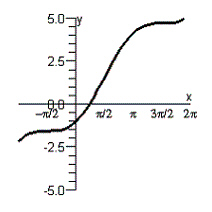
B)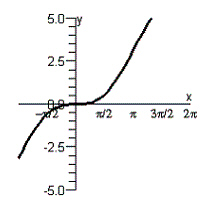
C)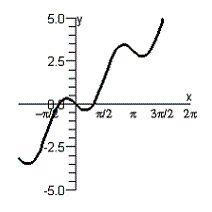
D)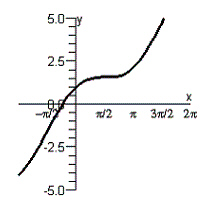
E)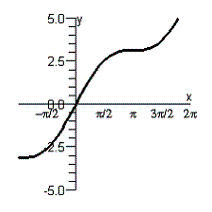

A)

B)

C)

D)

E)


Unlock Deck
Unlock for access to all 58 flashcards in this deck.
Unlock Deck
k this deck
50
Assume that a mass of m pounds on the end of a spring is oscillating in simple harmonic motion. What will be the effect on the period of the motion if the mass is increased to 25 m ?
A)The new period will be the same as the original period.
B)The new period will be 24 larger than the original period.
C)The new period is 25 times the original period.
D)The new period is 5 times the original period.
E)The new period will be 10 times larger than the original period.
A)The new period will be the same as the original period.
B)The new period will be 24 larger than the original period.
C)The new period is 25 times the original period.
D)The new period is 5 times the original period.
E)The new period will be 10 times larger than the original period.

Unlock Deck
Unlock for access to all 58 flashcards in this deck.
Unlock Deck
k this deck
51
State the values for which the function is undefined. 
A)
B)
C)
D)
E)

A)

B)

C)

D)

E)


Unlock Deck
Unlock for access to all 58 flashcards in this deck.
Unlock Deck
k this deck
52
Find the amplitude, period, and frequency of the simple harmonic motion. 
A)amplitude = 9, period = p , frequency =
B)amplitude = 9, period = , frequency = p
, frequency = p
C)amplitude = 9, period = , frequency =
, frequency = 
D)amplitude = 2, period = 2 p , frequency =
E)amplitude = 2, period = , frequency = 2 p
, frequency = 2 p

A)amplitude = 9, period = p , frequency =

B)amplitude = 9, period =
 , frequency = p
, frequency = pC)amplitude = 9, period =
 , frequency =
, frequency = 
D)amplitude = 2, period = 2 p , frequency =

E)amplitude = 2, period =
 , frequency = 2 p
, frequency = 2 p
Unlock Deck
Unlock for access to all 58 flashcards in this deck.
Unlock Deck
k this deck
53
Use the information below to find cos t given  .
. 
A)
B)
C)
D)
E)
 .
. 
A)

B)

C)

D)

E)


Unlock Deck
Unlock for access to all 58 flashcards in this deck.
Unlock Deck
k this deck
54
Find the phase shift and the period for the graph of the function. 
A)phase shift = , period =
, period = 
B)phase shift = , period =
, period = 
C)phase shift = , period =
, period = 
D)phase shift = , period =
, period = 
E)phase shift = , period =
, period = 

A)phase shift =
 , period =
, period = 
B)phase shift =
 , period =
, period = 
C)phase shift =
 , period =
, period = 
D)phase shift =
 , period =
, period = 
E)phase shift =
 , period =
, period = 

Unlock Deck
Unlock for access to all 58 flashcards in this deck.
Unlock Deck
k this deck
55
Graph the function defined by the equation. 
A)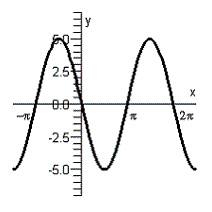
B)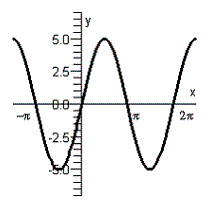
C)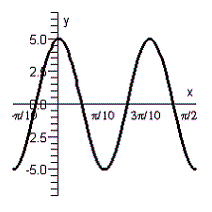
D)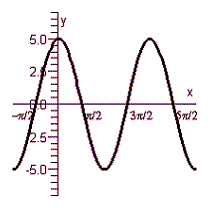
E)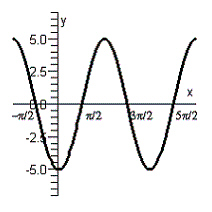

A)

B)

C)

D)

E)


Unlock Deck
Unlock for access to all 58 flashcards in this deck.
Unlock Deck
k this deck
56
Graph the function defined by the equation. 
A)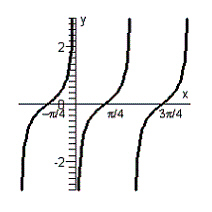
B)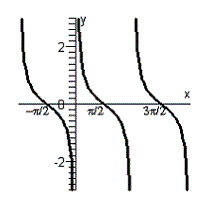
C)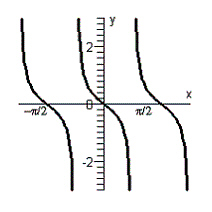
D)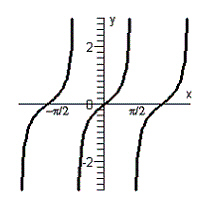
E)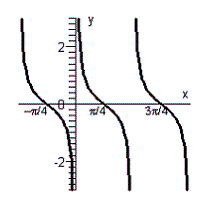

A)

B)

C)

D)

E)


Unlock Deck
Unlock for access to all 58 flashcards in this deck.
Unlock Deck
k this deck
57
Graph the function defined by the equation. 
A)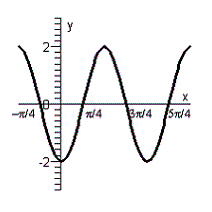
B)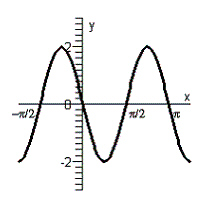
C)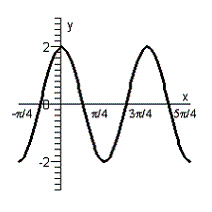
D)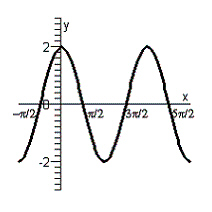
E)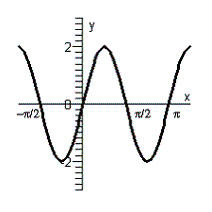

A)

B)

C)

D)

E)


Unlock Deck
Unlock for access to all 58 flashcards in this deck.
Unlock Deck
k this deck
58
Write an equation for the simple harmonic motion that satisfies the given conditions. Assume that the maximum displacement occurs when t = 0. Amplitude = 3.5 inches, frequency 1.5 cycles per second
A)
B)
C)
D)
E)
A)

B)

C)

D)

E)


Unlock Deck
Unlock for access to all 58 flashcards in this deck.
Unlock Deck
k this deck


